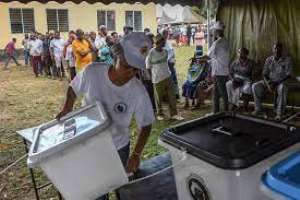
Depending on where you sit in Africa, you might have been hearing a lot of the election chatter that has characterised this season.
There are six more high-stake elections to watch out for in Africa between now and the first quarter of 2023, according to the Electoral Institute for Sustainable Democracy in Africa (EISDA).
The seventh country, Kenya, ended its polls on August 9 with results declared a week later by the Independent Electoral and Boundaries Commission (IEBC) on Monday.
Deputy President William Ruto was declared winner of Kenya's presidential election amid dramatic scenes, narrowly beating his rival, Raila Odinga, taking 50.5% of the vote, according to the official results.
The announcement was delayed amid scuffles and allegations of vote-rigging but all the same an imperfect election in all aspects is claimed a better choice than a military take-overs.
Disputing candidates have been subjecting the Kenya exercise to the supreme court for resolution and this is part of the beauty of democracy, ‘agree to disagree and having a legal platform for redress. Twice in Ghana, 2012 and 2020, the apex court presided over election disputes with Kenya getting a treble from the August 9, polls.
It is factual that the onset of the 21st century witnessed many African countries transitioning from military (and other forms of autocratic rule) to democratic governance.
An example of such countries is Ghana and Nigeria, which have consistently maintained their democracy for between two to three straight decades, the longest in the history of these west African countries.
There is no gainsaying the fact that periodic general election is perhaps the key driver of Africa's democratic stability. That is why upcoming elections on the continent are often keenly observed.
The rest of the upcoming elections highlighted by EISDA in order of timeline is:
Angola's General Election (August 24 2022)
Angola's upcoming general election slated for August 24, is critical for so many reasons. For one, it is the first election under President Joao Lourenco, the governing People’s Movement for the Liberation of Angola (MPLA) party, who is also vying to remain in office.
The whole world is watching to see whether his administration will ensure free and fair elections or whether he will want to carry on in the footsteps of his predecessor, the late President José Eduardo dos Santos.
President Lourenco's opponent in the upcoming presidential poll is Adalberto Costa Junior, leader of the opposition and current President of National Union for the Total Independence of Angola (UNITA).
Chad's National Assembly Election (September 2022)
Next month, Chadians will head to the polls to elect new lawmakers. This election is critical for maintaining democracy in this land-locked country in the centre of Africa.
São Tomé and Príncipe National Assembly, Regional & local (September 25 2022)
Lesotho's National Assembly Election (October 2022)
People in Lesotho will also be electing new lawmakers in October this October. The outcome of the election will also determine whether the incumbent Prime Minister Moeketsi Majoro gets to keep his job or not.
Mali's National Assembly Election (November 2022)
Much like Chad, Mali's upcoming national assembly election will serve as a test of democracy for the West African country, where the military recently took over power . In the meantime, the country is headed by Interim President Colonel Assimi Goïta, as well as acting Prime Minister Choguel Kokalla Maïga, whose fate will be determined by the outcome of the November election.
Nigeria's General Elections (February 23 2023)
A torrid high-stake event is the Nigerian general election coming up early next year. Much like the Kenyan election, the focus is on Nigeria's presidential election, contested by three leading candidates-Peter Obi of the Labour Party (LP), Babatunde Ahmed Tinubu of the All Progressive Congress (APC) and Atiku Abubakar of the People's Democratic Party (PDP).
As has been whispered, an imperfect presidential, national assembly and local elections are touted as better than a military junta in all instances.
Africa needs political stability now in furtherance of achieving the economic emancipation of the continent and not through military adventurism that has plunged some countries into democratic uncertainties.
Guinea, Sudan and a few more others are countries draped in coup d’tats and are attempting to revert to democratic rule.
Political connoisseurs have described democratic rule or governance as not a full-proof panacea for socio-economic emancipation or breakthroughs but a better option. Africa must embrace democracy through change of governments directed through the ballot box than the barrel of a gun.




 I'm not going independent; I’m still an NPP member — Kennedy Agyapong
I'm not going independent; I’m still an NPP member — Kennedy Agyapong
![National Chief Imam Sheikh Osman Nuhu Sharubutu[left] and Vice President Dr. Mahamudu Bawumia](https://cdn.modernghana.com/content__/84/56/617202494831-j4eq276ggb-img6278.jpeg) Not all people use their power for everyone’s benefit like Bawumia — National Ch...
Not all people use their power for everyone’s benefit like Bawumia — National Ch...
 Africa became an accidental victim of Russia-Ukraine conflict — Akufo-Addo
Africa became an accidental victim of Russia-Ukraine conflict — Akufo-Addo
 Be peaceful and united; don't allow yourselves to be used for violence — Muslim ...
Be peaceful and united; don't allow yourselves to be used for violence — Muslim ...
 Zuma's party joins S.African opposition alliance
Zuma's party joins S.African opposition alliance
 'NDC thrives on propaganda and illiteracy' — Obiri Boahen
'NDC thrives on propaganda and illiteracy' — Obiri Boahen
 Lawyer Obiri Boahen drops bombshell against African Leaders
Lawyer Obiri Boahen drops bombshell against African Leaders
 Eid-ul-Adha: Let’s all sacrifice for Ghana's progress—Bono Minister urge Ghanaia...
Eid-ul-Adha: Let’s all sacrifice for Ghana's progress—Bono Minister urge Ghanaia...
 Ellembelle Chief Imam urges EC to ensure level playing field for December electi...
Ellembelle Chief Imam urges EC to ensure level playing field for December electi...
 Tema Port receives largest container vessels named Kota Tema
Tema Port receives largest container vessels named Kota Tema
